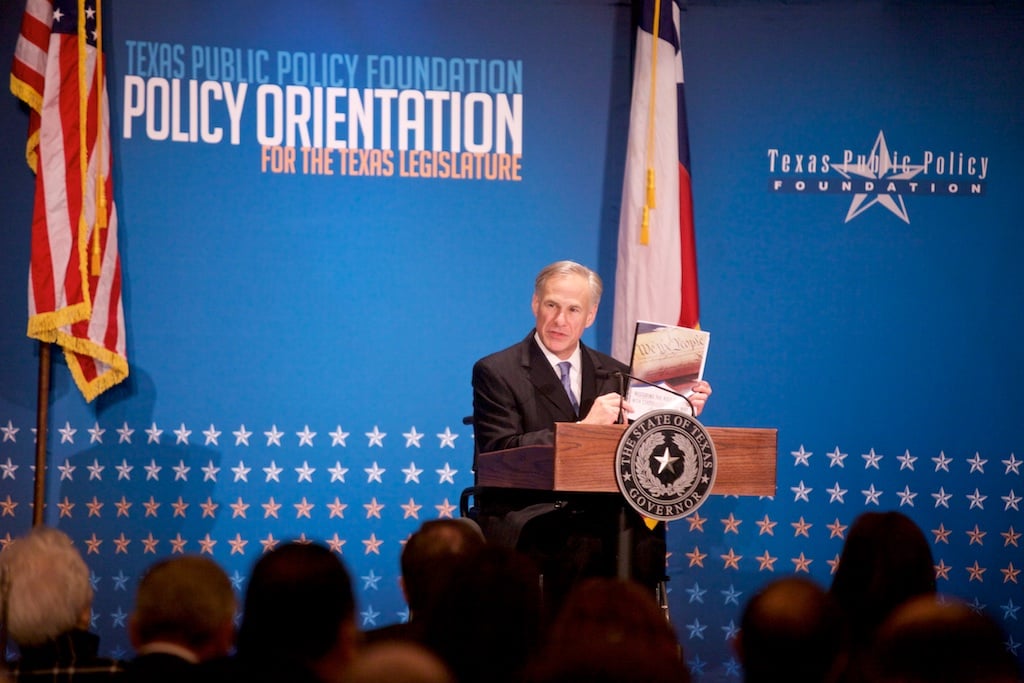
Introducing Greg Abbott’s ‘Texas Plan,’ the Best Plan for Your Crumbling Way of Life


Wise Rick Perry once said that states are “the lavatories of democracy,” and the Texas Public Policy Foundation’s annual summit is a usually a great place for lawmakers to find the latest load of crap. Whether it’s universal school vouchers or Medicaid block grants, many of the Texas Legislature’s hottest conservative fantasies begin with TPPF.
Today Governor Greg Abbott turned the tables, using his keynote address to unveil a far-fetched scheme of his own: to lead state legislatures in wresting control of the U.S. Constitution from the federal government. The plan is 92 pages long and is derived from his staff’s review, he said, of not only the Federalist Papers but the Anti-Federalist Papers as well.
It is called “The Texas Plan.”
“The repairs that you proposed through your policy solutions repair only the cracks in our government,” Abbott told the group’s members and acolytes, gathered over lunch in a ballroom at the Austin Hilton Friday afternoon. “If we really want to fix the problems we face today, we need to fix the fractured foundation of this country.”
No more dickering about reform, Abbott said. No more picking at the growing scab of tyranny. The time has come to reclaim the Constitution from the likes of Barack Obama, our liberal Congress and the left-wing activist judges of the Supreme Court. In his list of grievances against government in Washington, Abbott spared no branch.
“President Obama has regularly exceeded his executive powers,” he said, and “the Supreme Court is a co-conspirator in the abandonment of the United States Constitution.” And as for Congress, well, just look how they’ve perverted their constitutionally appointed role governing interstate commerce into an animal protection racket: “The only thing that should be endangered are the representatives that voted for the Endangered Species Act,” Abbott said.
“These increasingly frequent departures from constitutional principles are destroying the rule-of-law foundation on which this country was built,” Abbott explained between applause breaks. “We are succumbing to the caprice of men that our founders fought to escape.”
It was a heady half-hour, full of can-do verve and constitutional trivia. Holding a copy of his Texas Plan aloft, Abbott encouraged everyone in the crowd to read it, reassuring them that it included hundreds of footnotes. Here, at last, was a game plan to reclaim our liberties from our corrupt and out-of-touch elected representatives in Washington.

Abbott’s plan is easy. It requires our not-corrupt and very in-touch representatives in Austin to pass a resolution favoring a second constitutional convention of the states. At least 33 other states will have to do so as well. Once convened, the new convention can be employed to amend the constitution without meddling from any of the three branches of federal government, which have, after all, had their time and failed.
When the convention is convened, Abbott figures just nine new amendments should do the trick:
- Prohibit Congress from regulating activity that occurs wholly within one State.
- Require Congress to balance its budget.
- Prohibit administrative agencies — and the unelected bureaucrats that staff them — from creating federal law.
- Prohibit administrative agencies — and the unelected bureaucrats that staff them — from preempting state law.
- Allow a two-thirds majority of the States to override a U.S. Supreme Court decision.
- Require a seven-justice super-majority vote for U.S. Supreme Court decisions that invalidate a democratically enacted law.
- Restore the balance of power between the federal and state governments by limiting the former to the powers expressly delegated to it in the Constitution.
- Give state officials the power to sue in federal court when federal officials overstep their bounds.
- Allow a two-thirds majority of the States to override a federal law or regulation.
So-called Article V conventions like this have been proposed before. On the campaign trail lately, GOP presidential hopeful Marco Rubio has been calling for one to balance the budget and impose term limits on legislators. Supreme Court Justice Antonin Scalia has articulated his opposition to such a convention. “Whoa!” he said. “Who knows what would come out of it?” The idea has generally been considered something between social-studies trivia and fantasy. Today, Abbott called the process “a tool to chart our own destiny.”
Four states have lately passed resolutions calling for a convention to curb campaign spending. Abbott noted that Florida, Georgia, Alabama and some other states have already called for a broad constitutional convention that is similar to, but not nearly as good as, his “Texas Plan.”

Abbott left the stage to a thrilled ovation, and as the applause died down the room got to work. Within minutes, four men in the crowd were huddled around one man’s cell phone, looking at a color-coded U.S. map, counting their way up to 34, figuring at least 32 safe “yes” votes for a new convention. To join those ranks, Texas lawmakers will have to approve a resolution when they reconvene in a year.
2017 has never felt so far away.


